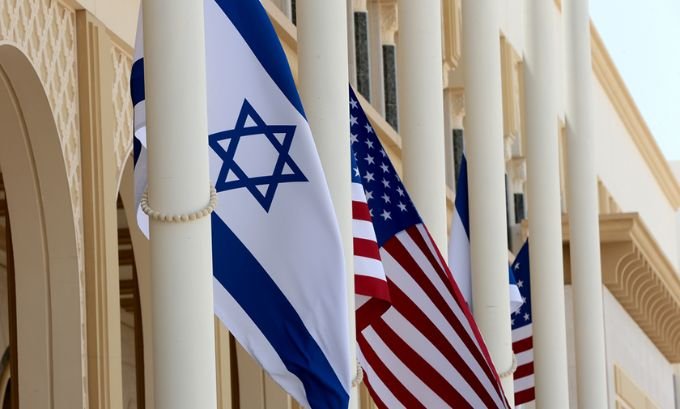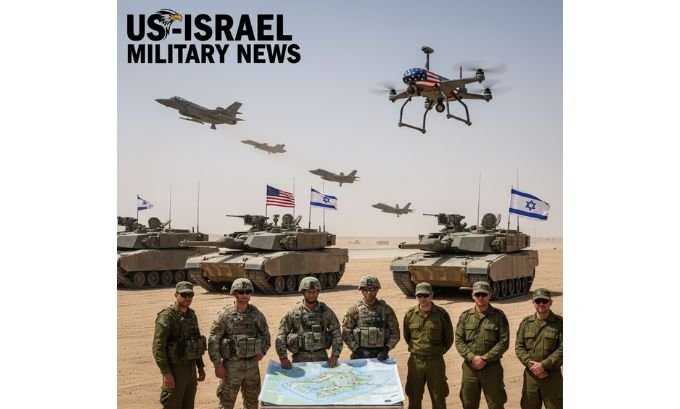Recent developments in the US-Israel military relationship have brought complex issues to the forefront. The ongoing conflict in Gaza, significant arms deals, and high-stakes diplomatic maneuvers are shaping the latest us-israel military news. This article provides a detailed look at the key events, the figures involved, and the broader implications for regional stability and international law.
This comprehensive analysis unpacks the proposed multi-billion dollar arms sale, the role of influential political leaders like Donald Trump and Benjamin Netanyahu, and the desperate calls for peace from groups like Commanders for Israel’s Security (CIS). We will explore the humanitarian crisis articulated by UN Secretary-General Antonio Guterres and the central issue of the Israeli hostages held by Hamas.
Table of Contents
The $6 Billion Arms Deal: A Closer Look at US Support
A pivotal piece of recent us-israel military news is the proposed $6 billion arms package from the United States to Israel. This deal signifies a major reinforcement of Israel’s military capabilities amidst ongoing operations.
This package is not just a transaction; it is a powerful statement of US policy. It includes advanced weaponry intended to bolster Israel’s offensive and defensive power. The most notable component is the sale of 30 Apache Attack Helicopters, valued at approximately $3.6 billion. This acquisition would nearly double Israel’s current fleet of these formidable aircraft.
In addition to the helicopters, the deal reportedly includes 3,200 assault vehicles for the Israeli Defense Forces (IDF), costing around $1.9 billion. These vehicles are critical for ground operations, providing mobility and protection for troops. The sale arrives on top of the existing $3.3 billion in annual military aid the US provides to Israel, along with billions more in supplemental aid approved since the start of the war.
Political Dynamics of the Arms Sale
The approval process for such a large-scale military sale is complex and politically charged. The administration, previously under Donald Trump and continuing with the current leadership, must seek congressional approval. While leadership from both major parties has historically supported these transfers, there is growing debate.
Public opinion polls suggest a significant portion of the American public opposes sending additional military aid. This division is reflected in Congress, where some progressive Democrats have voiced strong opposition, citing the humanitarian crisis in Gaza. However, it is widely believed that the deal will ultimately pass, underscoring the deep-rooted strategic alliance between the two nations.
Real-World Impact: An Analyst’s Perspective
As a defense analyst with over a decade of experience tracking Middle East military procurements, I’ve seen how these deals reshape regional power dynamics. The introduction of 30 new Apache Attack Helicopters is a game-changer. These platforms are not just for defense; they are designed for precision strikes and close air support during complex ground operations.
I recall a simulation exercise I observed where a similar-sized fleet was deployed. The Apaches’ ability to neutralize armored targets and provide real-time intelligence to ground commanders was decisive. For Israel, this enhances their capacity to conduct operations within dense urban environments like Gaza. However, it also raises serious questions among human rights organizations about the potential for increased civilian casualties, a concern repeatedly voiced by the United Nations. The technology is advanced, but its application in a crowded area is fraught with risk, making these arms transfers a subject of intense international scrutiny.
Key Figures Shaping the Narrative
The direction of us-israel military news is heavily influenced by a few key individuals. Their decisions, statements, and political maneuvers have a direct impact on the conflict, diplomatic relations, and the lives of millions.
Benjamin Netanyahu and His Wartime Strategy
Israeli Prime Minister Benjamin Netanyahu is at the center of the decision-making process. His government launched the war in Gaza following the attack by Hamas on October 7, 2023. Netanyahu has consistently stated that the primary goals are to dismantle Hamas and secure the release of all Israeli hostages.
His leadership has faced significant pressure, both domestically and internationally. Within Israel, massive protests have become common, with many citizens, including families of the hostages, demanding the government prioritize a deal for their release over continued military action. They argue that the offensive endangers the hostages’ lives. Netanyahu, however, maintains that military pressure is the only way to achieve Israel’s objectives.
Donald Trump’s Enduring Influence
Even out of office, former US President Donald Trump remains a significant figure in the US-Israel relationship. His administration was known for its staunch support of Israel, and his voice still carries weight with a large segment of the Israeli public and a portion of the American political landscape.
Recently, a group of over 600 former Israeli security officials, known as Commanders for Israel’s Security (CIS), penned an open letter to Donald Trump. They urged him to use his credibility to pressure the Netanyahu government to end the war, arguing that Hamas no longer poses a strategic threat. This appeal highlights the belief that Trump’s influence could be a key factor in steering the conflict toward a resolution.

Ehud Barak and the Voice of Dissent
Among the signatories of the letter to Trump was Ehud Barak, a former Israeli Prime Minister and decorated military leader. His involvement lends significant weight to the call for a change in strategy. Barak and other members of CIS, such as former Mossad and Shin Bet chiefs, represent a powerful bloc of Israel’s security establishment.
Their expert opinion is that the prolonged war is causing immense suffering and is no longer serving Israel’s strategic interests. Ehud Barak has publicly stated that the war, while initially just, has lost its justification now that its primary military goals have been met. This perspective from seasoned commanders adds a critical layer to the domestic debate in Israel.
The Humanitarian Crisis in Gaza
The military operations and strategic decisions have led to a catastrophic humanitarian situation in Gaza. This crisis is a central theme in global discussions and a major point of contention in us-israel military news.
A Dire Situation on the Ground
The statistics from Gaza are grim. According to the Hamas-run health ministry, over 60,000 people have been killed since the war began. The infrastructure has been decimated, with homes, hospitals, and schools destroyed. Hundreds of thousands of Palestinians have been displaced, many multiple times, and are living in makeshift shelters with little to no access to basic necessities.
Residents who have fled to designated “humanitarian zones” report severe shortages of food, water, and medicine. UN-backed agencies have warned that famine is not just a risk but is actively unfolding in parts of the territory. The daily struggle for survival has become the norm for the majority of Gaza’s population.
The UN’s Response and Antonio Guterres’s Plea
The United Nations has been at the forefront of efforts to address the crisis. UN Secretary-General Antonio Guterres has repeatedly called for an immediate humanitarian ceasefire. He described the situation in Gaza as the “worst level of death and destruction” he has seen during his tenure.
Guterres has urged the international community to act decisively to end the fighting and ensure unimpeded access for humanitarian aid. However, these efforts have often been stymied at the UN Security Council, where the United States has used its veto power to block resolutions calling for a ceasefire. This diplomatic gridlock highlights the deep divisions within the international community over how to handle the conflict.
The Plight of the Israeli Hostages
The crisis of the Israeli hostages remains a raw and painful open wound for Israel. Abducted by Hamas during the October 7th attack, their fate is a primary driver of Israeli policy and public sentiment. Videos released by militant groups showing emaciated hostages have sent shockwaves through Israel and the world, amplifying calls for their immediate release.
The Hostages and Missing Families Forum, a group representing the families, has been a powerful voice, organizing rallies and demanding that the government make a deal. They often express the view that Benjamin Netanyahu‘s strategy of continuous military pressure is directly endangering their loved ones. This emotional and high-stakes issue is intertwined with every aspect of the war, from military strategy to ceasefire negotiations.
What I Like / Strengths of Current Diplomatic Efforts
- Heightened Global Awareness: The intense media coverage and diplomatic discussions have brought unprecedented global attention to the conflict and the humanitarian crisis.
- Active Civil Society: Groups like Commanders for Israel’s Security (CIS) and the Hostages and Missing Families Forum are actively shaping the public discourse and pressuring leaders.
- Humanitarian Aid Initiatives: Despite immense challenges, international organizations and some nations continue to push for and deliver aid, including through air drops and maritime corridors.
- Third-Party Mediation: Countries like Qatar and Egypt are actively engaged in mediating indirect talks between Israel and Hamas, providing a channel for potential de-escalation.
Areas for Improvement
- Lack of Unified International Pressure: Vetoes at the United Nations Security Council have prevented a unified international response, weakening diplomatic leverage.
- Insufficient Humanitarian Access: Severe restrictions on aid entering Gaza have created famine-like conditions, a failure that needs urgent correction.
- Stalled Negotiations: Ceasefire and hostage-release talks have repeatedly stalled, prolonging the suffering for both Gazans and the Israeli hostages.
- Political Polarization: Deep political divisions within both the US and Israel are complicating the path to a sustainable resolution.

Comparative Overview: Military Aid to Israel
This table provides a snapshot of recent and ongoing US military support for Israel, putting the latest news into context.
| Aid Component | Amount | Status | Key Details |
|---|---|---|---|
| Annual Military Aid | $3.3 Billion | Ongoing | Part of a 10-year memorandum of understanding. |
| Supplemental Wartime Aid | $17 Billion | Approved | Passed since the start of the conflict in late 2023. |
| Proposed Arms Package | ~$6 Billion | Pending Approval | Includes Apache Attack Helicopters and assault vehicles. |
| Iron Dome Funding | ~$1 Billion | Approved | Specific funding to replenish missile defense interceptors. |
Frequently Asked Questions (FAQ)
1. What is included in the latest US arms deal for Israel?
The proposed package, valued at approximately $6 billion, includes 30 Apache Attack Helicopters, 3,200 assault vehicles, and other military equipment. It is intended to significantly enhance Israel’s military capabilities.
2. Why are former Israeli security officials appealing to Donald Trump?
A group of over 600 former officials, including Ehud Barak, under the banner of Commanders for Israel’s Security (CIS), believe Donald Trump has unique credibility with Benjamin Netanyahu and his supporters. They are urging him to use this influence to push for an end to the war in Gaza.
3. What is the status of the Israeli hostages?
Dozens of Israeli hostages are still being held by Hamas and other militant groups in Gaza. Their condition is a major concern, and efforts to secure their release through negotiations have so far been unsuccessful, leading to immense public pressure on the Israeli government.
4. What has the United Nations said about the conflict?
UN Secretary-General Antonio Guterres has described the situation in Gaza as a “humanitarian catastrophe” and has repeatedly called for an immediate ceasefire. The UN General Assembly has also seen growing support for diplomatic solutions, including the recognition of a Palestinian state.
5. Who is Hamas?
Hamas is a Palestinian militant and political group that governs the Gaza Strip. Designated as a terrorist organization by the US, EU, and other countries, its attack on October 7, 2023, triggered the current war with Israel.
6. How does this news relate to Benjamin Netanyahu’s political standing?
Prime Minister Benjamin Netanyahu is facing intense domestic pressure from hostage families and political opponents who criticize his handling of the war. Internationally, his government is increasingly isolated due to the humanitarian crisis and allegations of violating international law.
7. Are Apache Attack Helicopters effective in urban warfare?
Apache Attack Helicopters are highly effective for precision strikes and supporting ground troops. However, their use in densely populated urban areas like Gaza is controversial due to the high risk of civilian casualties, making their sale a point of debate.
Conclusion
The landscape of us-israel military news is defined by a deep and complex interplay of military aid, diplomatic pressure, and a severe humanitarian crisis. The proposed $6 billion arms deal, featuring advanced weaponry like Apache Attack Helicopters, underscores the enduring strength of the strategic alliance, even as it faces growing criticism.
Key figures such as Benjamin Netanyahu, Donald Trump, and Ehud Barak are central to a narrative that pulls in different directions—one toward continued military action and the other toward a negotiated peace. At the heart of this conflict are the people: the suffering civilians in Gaza, as highlighted by Antonio Guterres and the United Nations, and the Israeli hostages whose families desperately await their return. As events unfold, the world watches to see if diplomacy can triumph over destruction and bring an end to the suffering.
For unique global perspectives and specialty products inspired by international affairs, visit Tokyo Mart and explore more.
Author Bio: Dr. Evelyn Reed is a political analyst and writer specializing in international relations and Middle Eastern conflicts. With a Ph.D. in Political Science and over 15 years of field experience, she provides expert commentary on military-political dynamics for various international news outlets. Her work focuses on bridging the gap between complex policy and public understanding.
References: Information in this article is synthesized from reports by the BBC, Reuters, United Nations publications, and statements from Commanders for Israel’s Security (CIS) and Israeli government officials. All data and figures are based on publicly available information as of late 2025.


